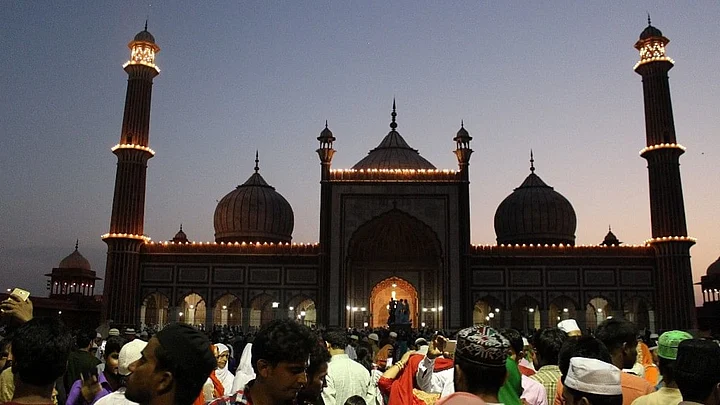(This article has been authored by a member of The Quint. Our membership programme allows those who are not full-time journalists or our regular contributors to get published on The Quint under our exclusive 'Member's Opinion' section, along with many other benefits. Our membership is open and available to any reader of The Quint. Become a Q-Insider today and send us your articles on membership@thequint.com.)
In light of the recent horrific attack on the controversial author, Salman Rushdie, the debate surrounding the freedom of speech and Islam’s position in relation to it has ignited anew.
Rushdie had once remarked in a 2015 interview, “Why can’t we debate Islam?” Some people are of the opinion that this is in contradiction with the view of those for whom the Qur'an is the literal word of God, which encompasses all professing Muslims.
A number of voices have arisen – within and otherwise – arguing for a reform in Islam that allows for criticism and debate. However, the very premise that Islam is closed to critical discussion is baseless.
Qur'an’s Invitation to Criticism and Debate
To any reader of the Qur’an, it is fairly evident that the text exhorts humanity to reflect and use their faculty of reason. Furthermore, a good portion of Qur’anic verses are a response to the various questions and doubts put forward by its audience.
For example, in the following verses, we can see that the Qur’an itself challenges its critics to engage with it and disprove its claims:
Or do they say, “He [Muhammad] has forged it”? Nay, but they believe not. Let them then produce something like it, if what they say is true! (Chapter 52 | Verses 33–34)
Do they not then reflect on the Qur’an? Had it been from anyone other than God, they would have certainly found in it many inconsistencies. (Chapter 4 | Verse 82)
Outlining the etiquettes and parameters of religious discussion, the Qur’an says:
Invite (all) to the Way of your Lord with wisdom and kind advice, and only debate with them in the best manner. Surely your Lord (alone) knows best who has strayed from His Way and who is (rightly) guided. (Chapter 16 | Verse 125)
Say, “O People of the Book! Come to a word common between us and you, that we shall worship none but God, shall not associate anything with Him, and shall not take one another as lords apart from God.” And if they turn away, then say, “Bear witness that we are submitters.” (Chapter 3 | Verse 64)
On the issue of coercion in religion, the Qur’an states unequivocally:
There is no compulsion in religion: true guidance has become distinct from error… (Chapter 2 | Verse 256
What Is the Source of This Intolerance?
In light of the Qur’an’s open attitude towards criticism and debate, one may ask: What has been the historical attitude of Muslims and why Muslims are perceived today to be intolerant towards criticism?
As for the historical attitude, there can be no generalisation; however, we observe that during the mediaeval era, there existed the phenomenon of majlis, where inter- and intra religious debates used to take place in a public arena.
The following statement by Caliph Al-Ma’mūn (d.833 AD) addressed towards the Christian theologian Theodore Abū Qurrah (d.820 AD) is an excellent example:
"This majlis is fair; in it no one is going to be assailed. Speak your disclaimer; answer without fear. Here there is ‘nothing but the best’ (Qur’an 29.46). No one will threaten you with anything, nor should you be distressed personally in regard to anyone. This is the day on which the truth is to be made evident. With whomever there is any knowledge for the verification of his religion, let him speak."
Reference: Griffith, S.H. (1999). The Monk in the Emir’s Majlis. In H. Lazarus-Yafeh, M.R. Cohen, S. Somekh & S. H. Griffith (Eds), The Majlis: Interreligious Encounter in Medieval Islam (pp.42).
In addition to verbal debates, Christian and Muslim theologians would continuously engage in written polemics with each other, thereby developing their tradition’s intellectual heritage for centuries to come.
As for the accusation of intolerance in few circles of contemporary Islamic clergy, there could be multiple reasons behind this phenomenon.
As per Syed Maududi, the rigid conformity exhibited by Muslims is post-colonial trauma that has impelled clerics to retreat behind a highly defensive approach. The prominent British scholar, Abdal Hakim Winter, argues that intolerance towards criticism stems from fear and anxiety that have nothing to do with traditional Islam.
Yet another important aspect in the debate of freedom of speech vis-à-vis Islam is the issue of blasphemy, meant here as speech whose objective is not to reach the truth but to be intentionally provocative and cause consternation.
From the Islamic paradigm, the purpose of free speech (including religious criticism) is the development of our thinking process and the acquirement of truth. If one concedes to this, then it can be contended that blasphemy often runs counter to these objectives.
Common sense dictates that insults and provocation mar civil discussion. If the aim of one’s criticism is to reach truth, however, then Muslims should have no qualms in engaging with such criticisms. Indeed, the Qur’an itself brings up several criticisms made and responds to them directly.
Clearly Muslims, whilst being averse to blasphemy, are not against religious criticism that stems from the desire to make apparent what one believes to be the truth. The issue then boils down to the tone and intended purpose of the critic’s critique.
In light of the above, it is hoped that Muslims and their critics should foster a favourable and cordial atmosphere to debate their respective positions.
(This is a member's opinion article and the views expressed are the author's own. The Quint neither endorses nor is responsible for them.)
